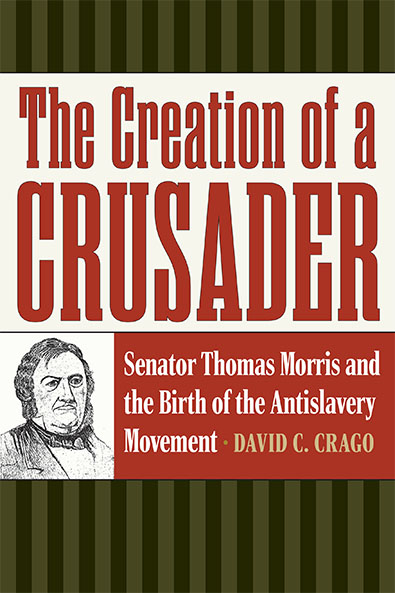Book Review: The Creation of a Crusader
The Creation of a Crusader: Senator Thomas Morris and the Birth of the Antislavery Movement. By David. C. Crago. Kent: Kent State University Press, 2023. Softcover, 248 pp. $39.95
Reviewed by Sarah Kay Bierle
In the 1830s the debate and discourse about slavery in the United States changed tone. For generations, there had been advocates for abolition and proponents for perpetual slavery, but in the third decade of the 19th Century, a shift began to enter American politics and thought. Moral objection to slavery rose, and defense of slavery moved from “necessary evil” to a society good that should be expanded. Thomas Morris from Ohio rose as a strong voice in the U.S. Senate against the expansion of slavery.
In this new book, author David C. Crago has created a political biography, rather than a traditional life story biography. The text skillfully follows the evolution of Morris’s political thought and actions from quiet senator to bold advocate for abolition. Morris’s opinions and interpretation of the U.S. Constitution changed over time as he gave the political and moral issue of personhood, property, slavery, and abolition more consideration. He realized that much of the question hinged in the 5th Amendment to the Constitution and the question of property, ultimately concluding that the U.S. Government did not have an obligation to protect slavery or its expansion.
Morris directly opposed John C. Calhoun’s preference for protecting and expanding slavery, and his responses on the Senate floor moved him to national prominence. He realized and used the term “Slave Power” to describe the southern section stances around banking, tariffs, nullification, and westward expansion, noting that much of their platform hinged around protecting and increasing slavery. Morris’s s public anti-slavery stance expanded to include advocating for civil rights, though not complete equality. No longer towing the Democrat Party line, Morris lost elections and was politically outcast. This led him to help organize the Liberty Party and work more closely with other anti-slavery organizations in Ohio. He did not fit the typical mold of an anti-slavery advocate; he was not religious and built his arguments through Constitutional interpretation, rather than emotional moralizing.
Morris died decades before the American Civil War, but his words and political stance built and influenced the anti-slavery movement. He has been described as a man ahead of his time with his pioneering political work, but his strict interpretation of the Constitution went against the views of others in the abolitionist camp. His shifting political views toward more liberty are a powerful reminder that it should be alright for politicians to change their views as their understanding of an issue increases.
Crago’s book fills a void in the understanding of the early, national political leaders of the anti-slavery movement. As he points out, Morris has been overshadowed or ignored in the historiography—much of that due to the disappearance of his personal papers, no known photograph or painting, and the folding of Morris’s ideas into later abolitionist platforms. The book’s chapters are a comfortable length for reading, and an index and extensive citation notes are included. The political movements, theories, and actions are clearly explained, but this might not be the easiest “first book to read” about this political era. Readers interested in early 19th Century American politics, Ohio politics, the abolitionist movement, and the rise of Republican party platform will find this book a valuable addition to their shelves.


Thanks for enlightening me on a Senator from my home state that heretofore was unknown to me. In Ohio it seems the”copperhead” politicians draw the most coverage.